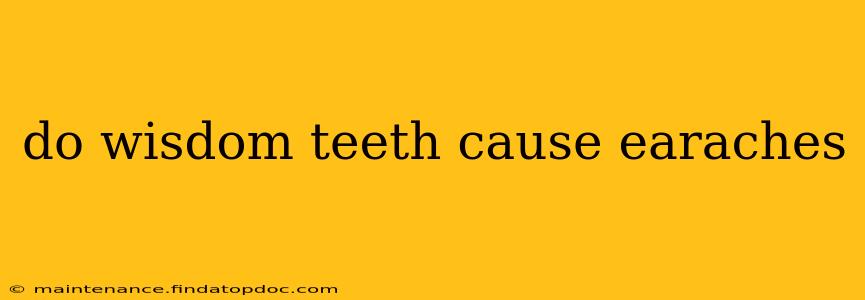Do Wisdom Teeth Cause Earaches? Understanding the Connection
The throbbing pain of a wisdom tooth eruption can be intense, and it's not uncommon for this discomfort to radiate to other areas of the head and face. Many people wonder: do wisdom teeth cause earaches? The short answer is yes, they can. While the ear itself isn't directly involved in the eruption process, the proximity of wisdom teeth to the nerves and structures responsible for ear sensation can lead to referred pain.
This article will explore the connection between wisdom teeth and earaches, explaining why this seemingly unrelated pain occurs and what you should do if you suspect your wisdom teeth are the culprit.
How Wisdom Teeth Can Cause Earaches: A Neurological Explanation
The trigeminal nerve, a major cranial nerve, innervates both the teeth and parts of the ear. When a wisdom tooth becomes impacted (stuck beneath the gumline), infected (pericoronitis), or causes inflammation (such as swelling), it can irritate the trigeminal nerve. This irritation can trigger pain signals that the brain interprets as originating from the ear, even though the actual problem is in the jaw. This is known as referred pain. Essentially, your brain gets the pain signals mixed up.
What are the other symptoms that might accompany a wisdom tooth related earache?
Experiencing an earache isn't always directly caused by wisdom teeth, so it's vital to differentiate it from other potential causes. Alongside the earache, other symptoms strongly suggesting a wisdom tooth issue include:
- Swelling in the jaw: Particularly around the wisdom tooth area. This swelling can be significant and make opening your mouth difficult.
- Jaw pain: Pain localized to the jaw, often radiating towards the ear.
- Gum pain and inflammation: Redness, swelling, and tenderness around the wisdom tooth.
- Bad taste in the mouth: Due to infection or inflammation.
- Difficulty opening the mouth: This is a common symptom of significant infection.
- Fever: This suggests a more serious infection.
- Headaches: While earaches can sometimes indicate an issue with wisdom teeth, headaches also occur independently, or in conjunction with wisdom tooth complications.
What if my earache isn't directly from wisdom teeth?
It’s crucial to remember that earaches can stem from various sources, including:
- Ear infections: These are common, particularly in children, and involve infection within the ear canal or middle ear.
- Swimmer's ear (otitis externa): An infection of the outer ear canal.
- TMJ (Temporomandibular Joint) disorders: Problems with the jaw joint can lead to pain in the jaw, ear, and head.
When Should I See a Dentist or Doctor?
If you experience an earache accompanied by any of the symptoms mentioned above, you should seek professional help promptly. Your dentist is the best person to assess your wisdom teeth and determine if they're the cause of your pain. They can perform a clinical examination and take X-rays to visualize the wisdom teeth and diagnose any potential issues. If an infection is suspected, your dentist may prescribe antibiotics. In cases of severe pain, impacted wisdom teeth, or persistent infection, extraction may be necessary. If your dentist suspects another issue is causing the earache, they can refer you to an ENT specialist (ear, nose, and throat doctor).
Don't delay seeking treatment. Ignoring a possible wisdom tooth infection can lead to more serious complications, such as a spread of infection, damage to surrounding teeth, or even serious systemic effects. Early diagnosis and treatment are essential for ensuring optimal oral health and alleviating your discomfort.
Can I treat a wisdom tooth-related earache at home?
While home remedies might provide temporary relief, they shouldn't replace professional dental care. Rinsing your mouth with warm salt water can help soothe inflammation. Over-the-counter pain relievers like ibuprofen can help manage pain, but they won't address the underlying cause. Always consult your dentist for diagnosis and treatment.
This information is for general knowledge and doesn't replace professional medical advice. Always consult a healthcare provider for any health concerns.
